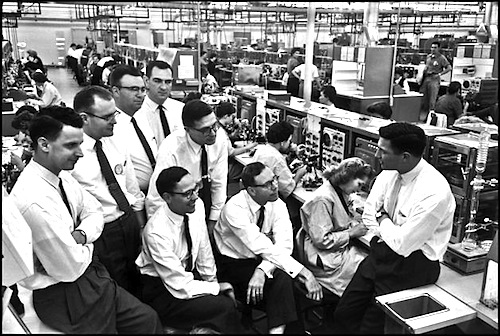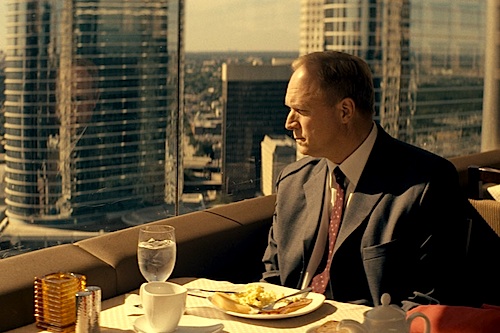By Joe Bendel. They made the space program and the personal computer possible. They were not just brilliant scientists. They were the original venture capitalists. The far-reaching scientific and economic revolutions initiated by Robert Noyce and his colleagues are explored in The American Experience’s first-rate Silicon Valley, which airs on most PBS stations this Tuesday.
A bright student at Grinnel College, Noyce happened to get an early look at two of Bell Labs’ first ever transistors, through his professor, Grant Gale. He would remain a foremost expert on the devices and their successors from that point forward. After an unrewarding East Coast corporate stint, Noyce joined soon to be Nobel Lauriat William Shockley’s semiconductor laboratory, in what was then nowheresville California. That was a somewhat gutsy move at the time, but Noyce was just getting started.
Fed up with Shockley’s erratic behavior and dubious strategic decision-making, Noyce and the rest of the so-called “Traitorous Eight” set out on their own, establishing Fairchild Semiconductor with the backing of Sherman Fairchild’s family of companies. Noyce was the last to join the insurgency, but the one most needed for Fairchild Semiconductors to make a go of it. He understood the science, but he also had persuasive powers the others lacked. Opting to develop a silicon-based semiconductor (a model Shockley had explicitly rejected), Fairchild scored some crucial government contracts right out of the gate. Yet Noyce would eventually pick up and start over once more. Ever heard of a company called Intel?

Co-written, co-produced, and directed by Randall MacLowry, Silicon Valley does two things unusually well. It nicely explains the enormous technological benefits offered by transistors, semiconductors, microchips, and microprocessors, in terms accessible for viewers not particularly savvy about the insides of their computers. It also gives Noyce and his comrades full credit for their game-changing entrepreneurship. MacLowry clearly establishes the substantial risks Noyce took, as well as the considerable reward he reaped. As a result, viewers might just find themselves feeling a vicarious giddiness for the up-start success of Noyce’s start-ups. That is a powerful response for a television documentary to inspire, but Silicon Valley is unquestionably the best of the last three seasons for American Experience, at least.
Many Fairchild and Intel alumni share their memories of Noyce and the formative years of Silicon Valley, including Andy Grove and surviving members of the infamous eight, Jay Last and Gordon Moore. MacLowry also incorporates a wealth of archival photos that vividly remind us of what the future used to look like in years past. The film is also a bittersweet reminder that California used to be synonymous with opportunity and new beginnings, rather than bankruptcy and stagnation. As a documentarian, MacLowery is rather diplomatic, completely ignoring Shockley’s later controversial championing of eugenics, simply depicting him as a miserable boss and incompetent businessman instead. Still, it is a reasonable call, considering how such hot button topics are apt to distract public television viewers.
It becomes obvious watching Silicon Valley what a great dramatic feature this story could become in the right hands. Dominic West would be a decent likeness for Noyce. However, in a world where Ashton Kutcher is cast as Steve Jobs, you have wonder whom Hollywood might come up with. Taylor Lautner, perhaps? At least MacLowry did right by the band of pioneers who made Silicon Valley what it is today. Highly recommended as a work of scientific, economic, and cultural history, Silicon Valley premieres this coming Tuesday (2/5) on most PBS outlets nationwide.
LFM GRADE: A
Posted on February 4th, 2012 at 9:59am.


